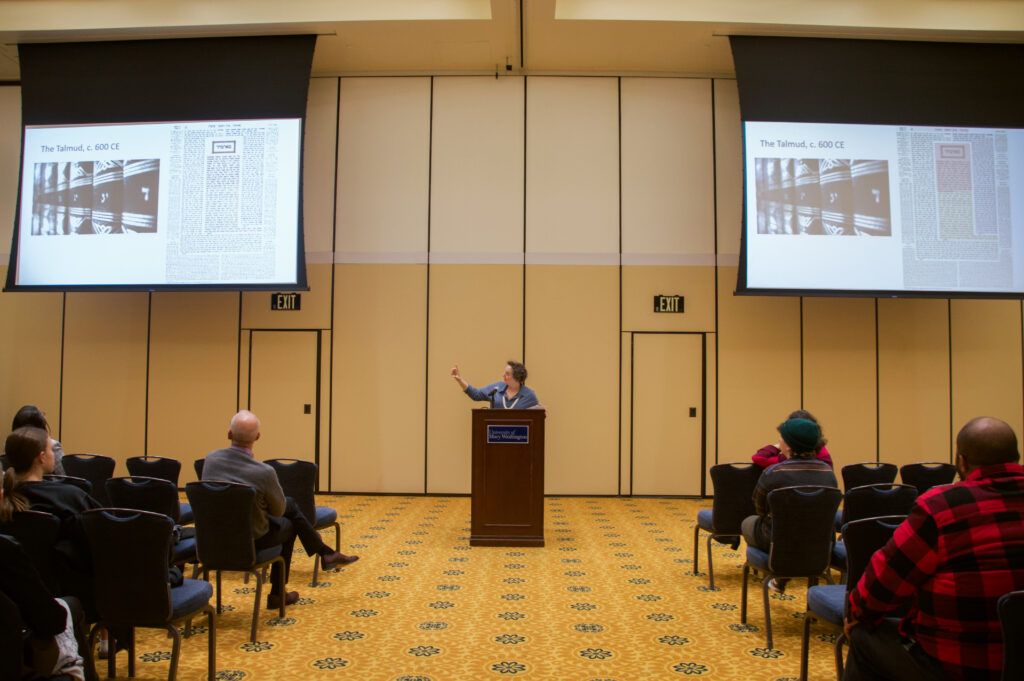UMW welcomes Elizabeth Shanks Alexander to discuss topics of Jewish texts and culture
4 min read
Dr. Elizabeth Shanks Alexander is a professor in the Department of Religious Studies at the University of Virginia. | Abbey Magnet, The Weekly Ringer
MELISSA LAMM
Staff Writer
On Wednesday, Nov. 15, UMW hosted Dr. Elizabeth Shanks Alexander, a professor in the Department of Religious Studies at the University of Virginia. She was welcomed as a guest speaker for the Jewish Cultural Celebration that took place in Chandler Ballroom at the University Center.
The Jewish Cultural Celebration was organized by senior history major and President of the Jewish Student Association Logan Kurtz who commented on the intentions behind this year’s celebration.
“I wanted the Jewish Cultural Celebration this year to have an emphasis of Jewish identity,” said Kurtz.
“How Judaism is more meaningful than just uniting against the hate of antisemitism.”
Alexander started her speech with the basics of Judaism and The Torah. The Torah, or “the instructions,” as she described them, is the centerpiece of Jewish identity dating back to around 500 B.C.E. She also introduced the Talmud, which consists of 63 volumes of “conversations and discussions” of the Torah and its teachings that were conducted just over 1000 years after the compilation of the Torah itself.
During her lecture, she pulled a passage from Genesis Rabbah 8:14, which describes the world above and the world below, referencing angels, beasts and their resembling characteristics to humans in the ways we are alike and different from each other.
Angels, for instance, stand upright, speak, see and understand, and they are also created in the image of the likeness of God, just as humans are. However, they are in stasis, which means that they do not live or die. Instead, they multiply and live forever, which means they do not grow or develop in any physical way.
According to Alexander, humans also have attributes that are associated with beasts. She explained how beasts eat, drink, are fruitful and multiply. But, as Alexander explained, they were not created in the image of the likeness of God and are mortal. Furthermore, unlike the angels, who stand upright on two legs, the beast stands on four.
“Humans share the characteristics from these two physical beings, from both the above and the below,” said Alexander. “With this, they find their meaning, their purpose in this world.”
To Alexander, there are two models that can be used to explore this passage. One is how God’s creation of humans stems from taking “the good stuff from the angels and the good stuff from the beasts.” The second model is that humans are given the choice of whether they want to be more like angels or beasts.
“Humans can, through their choices, be beastly or angelic,” said Alexander.
After the initial speech, Alexander accepted questions from the audience.
Dr. Marion Sanford, the director of the James Farmer Multicultural Center asked, “Do humans become angels in the afterlife?”
“No,” said Alexander. “What’s interesting in the Jewish tradition is that humans are a higher form of existence than angels in certain ways precisely because humans have the ability to choose to do God’s will.”
Alexander explained how angels are designed to praise God and that this praise is automatic in a sense. She clarified, however, that humans have the capacity to choose to be dedicated to God and how that is now more meaningful in Jewish tradition.
Freshman sociology major Rin Northedge asked Alexander to elaborate on “the relationship between women and The Torah and how it’s different [for] people in different categories.”
This question aligned with Alexander’s study of the relationship between gender and Judaism. She explained that to teach a woman about The Torah is to teach her “tiflut,” which, according to Alexander, means “lewdness” in Hebrew. In other words, to teach a woman the Torah is seen as a bad thing, as she would break traditional societal boundaries.
“When the rabbis wrote the Torah and the Talmud, it was intended to be passed from one man to another man,” said Alexander.
She also explained that the Hebrew language is a highly gendered language.
“In Hebrew, every single word, every single adjective, every single verb has grammatical gender,” said Alexander. “This leads to a phenomenon called ‘the default masculine.’”
This means that the interpretation of the Torah can be unclear, as “he” can refer to everyone through the default masculine, or it could be interpreted as a message directed towards men.
She finished by reciting a saying from the Talmud, which is translated as “it is not upon you to finish the labor, but neither are you exempt from applying yourself.” Alexander said the saying “seemed apropos when considering what it means to live in a messy world.”
During her speech, Alexander commented on the political and social environment following the Israel-Hamas war and the international effects of the conflict.
“I want to acknowledge the present moment in which many Jewish and Muslim students on campuses are very vulnerable,” said Alexander. “Who knew when we spoke two months ago about this event, that the idea of celebrating Jewish culture would be so important.”


